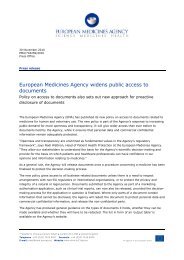1 Selective serotonin reuptake inhibitors (SSRI) â sales, withdrawal ...
1 Selective serotonin reuptake inhibitors (SSRI) â sales, withdrawal ...
1 Selective serotonin reuptake inhibitors (SSRI) â sales, withdrawal ...
Create successful ePaper yourself
Turn your PDF publications into a flip-book with our unique Google optimized e-Paper software.
<strong>withdrawal</strong> syndrome seems to be the same: difficulty stopping the medication because it provokes<br />
symptoms.<br />
The role of drug agencies<br />
It can be questioned if the risk management principle is sufficient to protect the public against the<br />
risks of drugs. It would seem that the doubt and uncertainty favour the drug companies rather than<br />
the patients. John Abraham (34) suggested that drug regulatory decision-making may be understood<br />
in the light of a permissive principle, i.e. a tendency to permit a technology on the market, even if it<br />
does not meet the standards of efficacy and safety, in contradiction to a precautionary principle.<br />
Abraham (7, 27) found that drug regulators tend to weigh the balance of scientific doubts about<br />
drug safety in favour of the manufacturer, both pre- and post-marketing.<br />
Malcolm Lader (8) described this conservatism in relation to the benzodiazepines. David Healy (11)<br />
showed that the regulatory bodies have only minimal audit functions, as it is the pharmaceutical<br />
companies that decide which trials to conduct, and trials are conducted to fit marketing; they are not<br />
driven by safety concerns. McGoey (9) described that the UK medicines agency has been mandated<br />
over and over again to address the issue of safety of <strong>SSRI</strong>s, but the consequence was that the<br />
authority of drug regulators was strengthened rather than being challenged. She has suggested that<br />
ignorance within the drug regulator is being used as an anti-strategy, in order not to reach<br />
conclusions on safety.<br />
It is a part of drug approval today that the marketing authorization applicant shall prepare a risk<br />
management plan for the specific drug and it shall contain a list of identified and potential risks<br />
when using the drug, also the risk of misuse. A risk minimisation program can be required by the<br />
drug agency in order to reduce known risks (35). This aims at improving patient safety and is<br />
strengthening the risk management model of drug regulation.<br />
Limitations of our study<br />
We limited our searches to documents from FDA, MCA/MHRA, DKMA and EMA. There was<br />
consistency between the documents we retrieved. It might be surprising that the search only<br />
revealed 23 <strong>SSRI</strong> documents and 6 benzodiazepine documents. The reasons for this are several. It<br />
took time before the adverse effects reached the agenda of the drug regulators and we only searched





